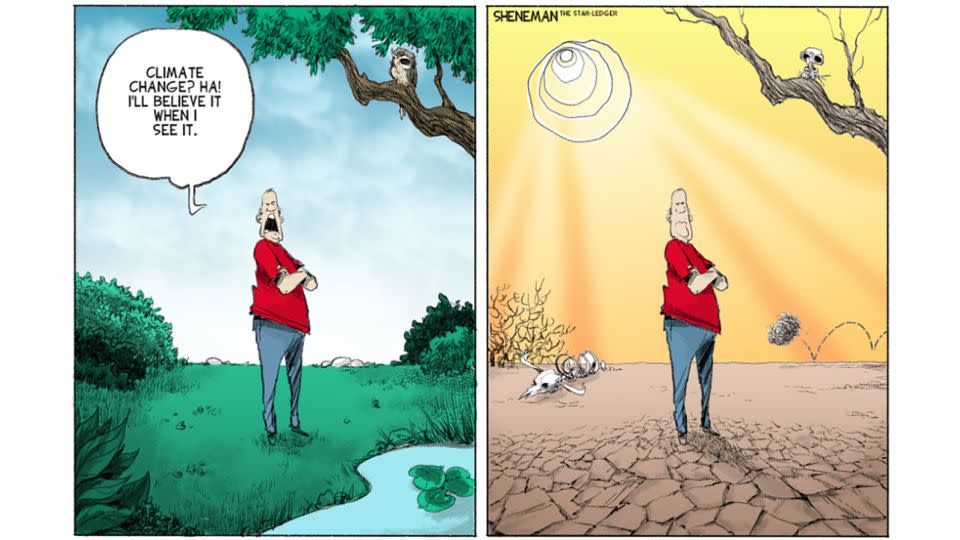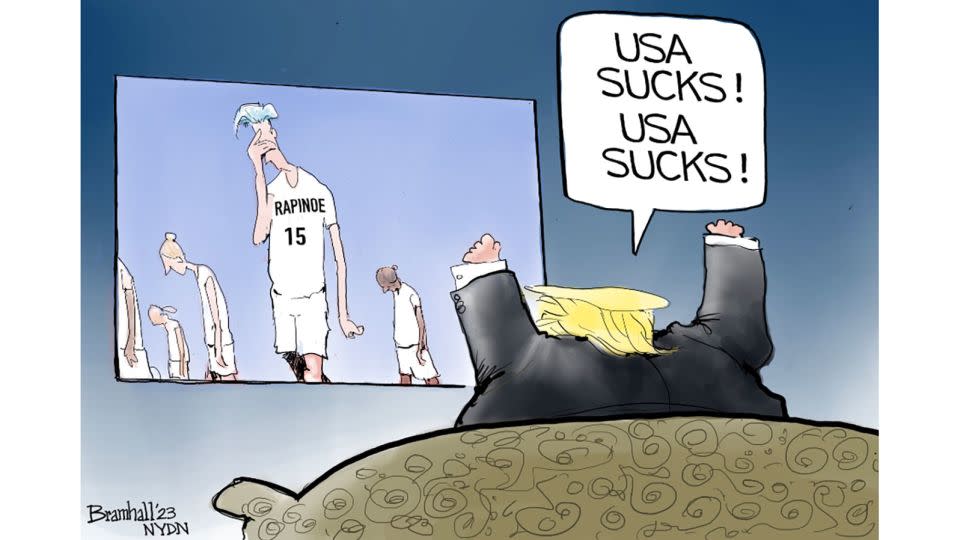Opinion: The shattering aftermath on Maui
- Oops!Something went wrong.Please try again later.
- Oops!Something went wrong.Please try again later.
The Polynesian demigod Maui was so powerful he could raise islands up from the ocean floor and capture the sun to slow it down. But residents of the Hawaiian island named after that mythical figure were seemingly powerless last week to escape the deadly wildfires that were driven by winds from an offshore hurricane.
Some who could flee jumped into the ocean and had to be rescued by the Coast Guard — while many others had no time to run from the fire. Buildings were reduced to charred rubble and bare foundations — what CNN’s Bill Weir called “scorched skeletons” — while cars became hollow shells. The deadliest US wildfire in more than a century took a devastating toll. As of Sunday, officials said, at least 93 people had died and the search of the area was continuing.
Jeff Melichar, a retired commercial real estate agent who has lived in Lahaina for 28 years, woke up Tuesday to the strongest winds he’s experienced there. “The 60 mph winds left fallen trees, smaller structures down and clouds of dust everywhere. It wasn’t until later that day when I noticed a large dark smoke cloud over the Lahaina commercial district that kept growing as the day progressed. My neighbors and I never imagined the nightmare this smoke cloud would become in just a matter of hours.”

That evening, Melichar recounted, “A friend and I walked through the neighborhood around 7:30 pm and noticed that the fire had jumped Shaw Street, a relatively short road that leads to Front Street, right by the ocean where the commercial district starts, and was heading in our direction. We were in awe of how quickly the fire had spread. Fearful, we rushed back home because we knew we had to get out. … As I pulled out of the driveway, I couldn’t help but think that this was probably the last time I would ever see my house. It was heartbreaking.”
“Nobody saw this coming, and it happened so quickly. We know Lahaina will be rebuilt, and the government response — city, state and federal — will be a huge part of that. But at this very moment it’s hard to find hope.”
The idea of Hawaii as a paradise, untroubled by the world’s problems, vanished along with the homes and historic buildings of Lahaina. Naka Nathaniel, an opinion columnist for the Honolulu Civil Beat, pointed out that “what is unfolding in Maui is a stark reminder that Hawai’i is tragically just another place on the planet dealing with the problems that exist in the rest of the world.”
The island state is “reeling and in shock,” with a death toll that is “simply soul-crushing.” But he added that his family’s hometown, Hilo, on Hawaii’s Big Island, “was devastated by tsunamis in 1946 and 1960” and that the island of Kaua’i “was slammed by Iniki, a Category 4 hurricane, on September 11, 1992. Property damage is still very visible more than three decades later.”
“The multi-millionaires and the billionaires that made Maui a popular playground for the wealthy will be fine, but, as of 2022, more than half of Maui’s residents were categorized as ‘Asset Limited, Income Constrained, Employed’ (ALICE) in a study released by the Aloha United Way, a nonprofit community impact organization. In the county of Maui, 16% of the population is living below the federal poverty line.”
Along with many other parts of the nation, Hawaii is facing increasing threats due to changes in climate. CNN’s investigative team reported that “Hawaii officials underestimated the deadly threat of wildfires even as they acknowledged a lack of necessary resources to mitigate them, according to a CNN review of state and local emergency planning documents that show how ill-prepared the state was for the disaster.”
In the New York Times, Lawrence Downes observed, “To live in my home state or to love it from a distance is to know the continual threat of hurricanes, tsunamis, earthquakes and volcanoes.”
“But a lethal wildfire? That was new for Hawaii. And everything is changed. … Shock and grief in Lahaina will have to ease before the reinvention begins. But Hawaii has reinvented itself many times.”

Two years later
This week marks the second anniversary of Taliban’s takeover of Afghanistan amid America’s troop withdrawal. “On August 15, 2021, the Taliban marched into Afghanistan’s capital, Kabul,” wrote Peter Bergen and Laura Tillman. “Since then, they have banned women from jobs and have not allowed girls over the age of 12 to return to school. Afghanistan is the only country in the world that has suspended girls from school and women from universities.”
“The Taliban have also provided safe haven to around 20 terrorist groups, including al-Qaeda, according to a UN report that was released two months ago. As the US military rushed for the exits in the summer of 2021, 70,000 armored vehicles and more than 100 helicopters were left behind, an arsenal worth an estimated $8.5 billion, according to the UN.”
According to retired Gen. David Petraeus, former commander in Afghanistan, the US agreement with the Taliban to withdraw all its troops “ranks with the worst diplomatic agreements in our history. We gave the Taliban what they wanted: We’re leaving. The only thing we got in return was a promise they wouldn’t attack us on the way out.” Bergen and Tillman fault former President Donald Trump’s administration for negotiating a flawed deal and President Joe Biden’s administration for carrying out the arrangement.
2024
In a portent of the issues that could sway the 2024 election, Ohio voters handed abortion rights advocates a critical victory on Tuesday by decisively rejecting a Republican effort to make it harder to amend the state constitution. The referendum was widely understood as an attempt by the GOP to sink a vote this fall on a constitutional amendment to ensure that “every individual has a right to make and carry out one’s reproductive decisions.”
Mary Ziegler wrote, “This vote underscores just how potent abortion rights can be as an issue heading into the 2024 presidential election.” But Democrats face challenges converting voters’ views on abortion rights into support for individual candidates.
“CNN’s recent poll found a high level of frustration among pro-choice voters with current party leadership,” Ziegler observed. “Nearly 80% of those who disapproved of the Supreme Court’s decision to reverse Roe felt that politicians at the federal level weren’t doing enough to protect abortion access (the figure at the state level, 60%, was also strikingly high).”
Republican analyst Patrick T. Brown explored the flip side of the question: “The result in Ohio’s vote on a change to its referendum law underscored a political reality that Republicans are still coming to grips with. Pro-life politicians can, and do, rack up resounding victories, even after signing major restrictions on abortion into law. But when the topic of abortion itself is on the ballot — directly, or, in the case of Ohio, indirectly — the side in favor of expanding the right to abortion continues to hold the upper hand.”
If Ohio’s abortion rights amendment passes this fall, Brown argued, “that would put Ohio in a similar category to California, Vermont and Michigan, where voters have enshrined an expansive right to reproductive autonomy in their state constitutions. If the trend continues, other states, even those with a reddish hue, may be next.”
“For the pro-life movement, this outcome should be a five-alarm fire” and “drives the fact home that no one who fought to see Roe v. Wade overturned, least of all me, had a satisfactory game plan for the battles that would ensue following Roe’s demise.”
On the Democratic side, a big worry is that voters are in a sour mood about the economy, despite signs of declining inflation, robust job growth and hope for a “soft landing” after the Federal Reserve sharply raised interest rates over the past year and a half. House Speaker Kevin McCarthy slammed Biden after a slight uptick in July’s consumer price index, the first such increase in more than 12 months. (But experts said that the details of the index show that inflation is still slowing.)
“Biden and his fellow Democrats should not take the rhetoric lightly,” observed Julian Zelizer. “The messages coming from the GOP can be effective.”

World Cup exit
There won’t be a historic “three-peat.” After winning the FIFA Women’s World Cup in 2015 and 2019, the US Women’s National Soccer Team was eliminated from this year’s tournament in the round of 16. The disappointing performance provoked an unusual reaction from some on the right, including Donald Trump.
Podcaster Megyn Kelly echoed the former president, saying “I’m thrilled they lost,” and blaming it on the team’s “woke activism.”
“As so often happens on Kelly’s show,” wrote Nicole Hemmer, “her attacks on the team quickly transformed into attacks on trans women.”
US star player Megan “Rapinoe, she said, supports the idea of trans women playing on the national team, just another reason the team deserved to lose. The argument was part of Kelly’s broader assertion that trans rights are anti-woman, and the real defenders of women’s rights today are those people who work to deny trans people access to facilities that match their gender identity (and refuse, as Kelly does, to use their preferred pronouns).”
“Over the past few decades, right-wing women have adopted what seems like a have-your-cake-and-eat-it-too sort of antifeminism,” wrote Hemmer. “You can beat the drum of ‘women’s rights’ and defend tooth-and-nail women’s sports, so long as you only do so to denigrate trans women.”
For more on the World Cup:
Shaista Aziz: This Women’s World Cup has been unlike any other. That’s a great thing
Amy Bass: The US loss at the Women’s World Cup sends a clear message

Let’s make a deal?

Most federal criminal cases never go to trial; the vast majority end with prosecutors and defendants reaching a plea bargain. So it’s not surprising to see speculation about whether Trump, already the target of three indictments and a subject of a fourth investigation that’s about to come to a head in Georgia, might be interested in striking a deal.
As William D. Cohan wrote for Puck, David Rubenstein, a billionaire who made his fortune in private equity, has called for Biden to offer Trump a pardon in return for dropping his candidacy for 2024 and any future elections, with Biden then agreeing that he too wouldn’t run.
New York University professor Scott Galloway argued along somewhat similar lines that Trump might be feeling some pressure to cut a deal. As Jill Filipovic noted, “Trump is facing federal charges in two jurisdictions, along with state charges in a third and the possibility of state charges in a fourth (he has pleaded not guilty to all charges against him). In a country where federal prosecutors overwhelmingly win their cases, Trump’s odds of going to trial and winning both federal cases are slim — and he may face similarly daunting odds in the other cases. Even Trump, Galloway argues, can do math that simple — and thus would want to look for a deal to avoid a possible prison term.”
The outcome “would certainly be better for the nation than Trump winning in 2024 and pardoning himself; it would be better for Trump than winding up behind bars. Any reasonable person would look at the weight of the cases against him and the long odds of prevailing in all of them, and start talking about his options.”
“The problem is that Donald Trump is not reasonable…”
“If he’s reasonably confident that he can win in 2024,” Filipovic observed, “then Trump could claim he has little to worry about, as his plan is no doubt to pardon himself…This may also stir up his supporters, many of whom seem at least partly motivated by a desire to stick it to liberals and other perceived enemies: What better way to make a mockery of rule-of-law moderates and democracy-obsessed libs than to get their guy back into an office vested with the power to put himself and his associates outside the reach of the law?”
For more:
SE Cupp: Is Jesus too woke for Trump evangelicals?
Student debt strategy
As soon as the Supreme Court struck down Biden’s student debt relief plan in June, the administration announced it would try again to forgive some debt, citing a different legal basis. Kelli Rhee, CEO of Arnold Ventures, a philanthropic group, predicted that “what’s likely to follow is a repeat of last year’s legal back-and-forth: a lawsuit, a protracted court battle and persistent uncertainty for borrowers.”
Instead, she argued, Biden should focus on stopping the growth of the $1.6 trillion education debt pile by seeking to make “colleges accountable for their value and ensuring borrowers have the support they need.”
Among the steps recommended by Rhee: “holding predatory for-profit colleges — of which there are hundreds in the US — and career-training programs accountable. Even before the pandemic brought the student loan problem into sharp relief, millions of student borrowers were in default, a burden that often falls disproportionately on those who dropped out of college and those who attended schools that charge for largely valueless degrees, or those that produce a negative return on investment.”
Don’t miss

Brian Elmore: I see the cruelty of US immigration policy up close
Sen. Elizabeth Warren: America’s child care crisis is about to get a lot worse
Adam Kinzinger: Why Republicans are turning against aid to Ukraine
Aanchal Saraf and Rebecca H. Hogue: Oppenheimer’s not your daddy
Peniel E. Joseph: The legend who mentored the Obamas is a friend I’ll never forget
Neil J. Young: AP Psychology controversy exposes the lie behind Florida’s push for ‘parental rights’
Holly Thomas: What nearly every human seems to be missing about shark attacks
AND…
Misbehaving
When Sara Stewart went to see “Oppenheimer,” she wound up sitting behind a “scroller … for whom even an IMAX screen and Christopher Nolan’s cinematic mastery could apparently not compete with TikTok.”
At a showing of “Barbie,” she wrote, “I was treated to a loud man talking through most of the film’s latter half, perfectly embodying the entire toxic-Kens plot. (The distributor of “Barbie” and CNN share a parent company, Warner Bros. Discovery.)”
“We are officially in a Bad Audience Summer,” Stewart observed, noting “a slew of hand-wringing articles about a drastic decline in people’s behavior in cinemas. More disturbingly, a number of touring musicians have had objects thrown at them onstage, in some cases causing injury, and in all cases just being completely unacceptable.”
She offered some proposals for dealing with audience rudeness — and added: “Ultimately, most of the current crisis comes down to social media, which has created a worldwide network of addicts with an incessant need to multitask and a never-ending challenge to go viral by any means necessary.”
For more CNN news and newsletters create an account at CNN.com

